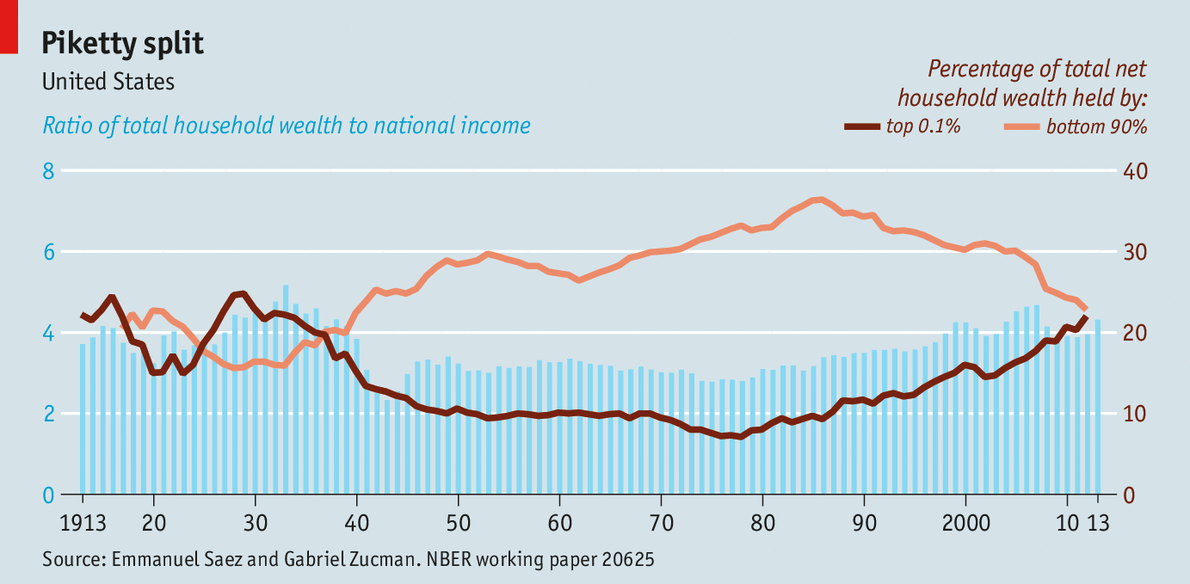- Joined
- Dec 13, 2015
- Messages
- 9,594
- Reaction score
- 2,072
- Location
- France
- Gender
- Male
- Political Leaning
- Centrist
Five things Donald Trump thinks about trade that are not true
Donald Dork is a brainlessly elected PotUS purely by the accident of a two centuries-old misconceived Electoral College imbalance with the popular-vote (which Hillary won by more than 2%).
Americans cannot seem to bring themselves to a thoughtful consideration of how to "improve their democracy" by removing the impetus to knee-jerk lowering of Upper-income Taxation, which is centrally responsible for America's long-term Income Disparity. Which America has brought about by multiple Replicant administrations' genuflection at the altar of Mammon.
Is the American public up to realizing the key affliction of Income Disparity and want to do something about it? The Romans didn't more than 2000 years ago, and look what happened to their "empire".
Only time will tell ...
AMERICA’S president has a winners-and-losers perspective on most, perhaps all, transactions. He thus believes that persistent trade deficits are by definition a problem.
This is wrong. The willingness of other countries to send America more stuff than America sends back to them has meant that for most of the past four decades Americans have been able to consume more than they produce. That is, without question, a good position to be in. It also means that America owes money to the rest of the world, in the form of low-yield bonds. The rest of the world likes holding these, and America benefits from selling them.
Americans earn more on their foreign investments than foreigners earn on American bonds. America could have made much better use of this line of cheap credit than it has. But that is America’s problem, not the trading system’s.
Having taken against it, Mr Trump thinks America’s trade deficit can be fixed by tariffs. But studies of tariffs show that though they reduce trade, they do not reliably increase the tariff-raising country’s trade balance. In part this is because if imports fall, foreigners will get fewer dollars, and the dollar will gain value through scarcity. A strong dollar makes American exports less appealing, so they drop just as imports do, and the deficit persists. Mr Trump also thinks his steel and aluminium tariffs will mean less unemployment. This is highly unlikely. A lot more jobs hinge on using these metals than providing them; higher prices hurt those jobs. And better technology has seen employment in steel and aluminium industries fall much faster than production. Increased production will not necessarily provide more jobs making metal in the long term.
Mr Trump has also argued that if another country has higher tariffs on American goods than America has on its goods, America should be able to raise its tariffs. This goes against the “Most favoured nation” rules of the World Trade Organisation (WTO), which require a country to extend tariff cuts agreed with one country to everyone else. This principle of non-discrimination is supposed to stop countries from bullying their trading partners by threatening tariff increases, and protect them from being discriminated against. To abandon this principle would be to abandon the WTO.
Bringing down the WTO might not matter to America if, as Mr Trump has tweeted, trade wars are easy to win. He seems to base this on the fact that America buys more than it sells, so its trading partners have more to lose. But although most households buy more from their local supermarket than they sell to it, they would not be better off growing their own food. Blocked imports, higher prices and broken supply chains would harm America’s economic potential.
Yet one of Mr Trump’s beliefs on free trade is true. The people who voted for him do not like it. Just over half of all Americans think free trade is a good thing. But white Americans, older Americans and less-educated Americans are all less likely to think so than their typical fellow citizen.
Donald Dork is a brainlessly elected PotUS purely by the accident of a two centuries-old misconceived Electoral College imbalance with the popular-vote (which Hillary won by more than 2%).
Americans cannot seem to bring themselves to a thoughtful consideration of how to "improve their democracy" by removing the impetus to knee-jerk lowering of Upper-income Taxation, which is centrally responsible for America's long-term Income Disparity. Which America has brought about by multiple Replicant administrations' genuflection at the altar of Mammon.
Is the American public up to realizing the key affliction of Income Disparity and want to do something about it? The Romans didn't more than 2000 years ago, and look what happened to their "empire".
Only time will tell ...
Last edited:

